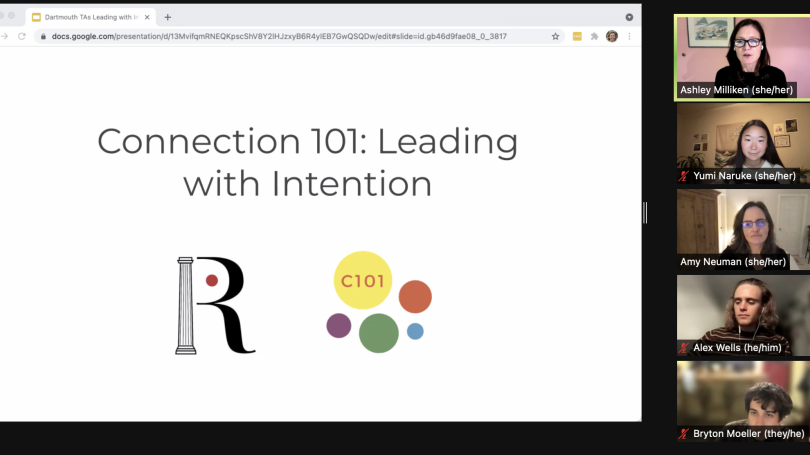
- Public Policy
- Leadership
- Funding
- News & Events
- About the Center
Back to Top Nav
Back to Top Nav
Back to Top Nav
Back to Top Nav
Thanks to funding from the Rockefeller Center this Fall, the Teaching Assistants for ENGS 12 (Introduction to Design Thinking) were able to attend a virtual session with Connection 101. Through the session, members of the teaching team learned about psychological safety and leadership styles to help us work in a more healthy way as a team.
The first section of the session was devoted to psychological safety. Connection 101 introduced us to Amy Edmonson's 7 questions for measuring psychological safety--a useful tool for understanding what to look for in teams with a healthy dynamic. One of those questions: "Is it easy to ask other members of this team for help?" stood out to us as TAs. Often we have to rely on one another to help support student teams as they work through projects when our availability and expertise aren't aligned perfectly with the teams we hope to help. In the session, we were also able to ask ourselves and each other what interactions should look like within student teams to promote psychological safety. These conversations have helped us provide ENGS 12 students with constructive feedback that has helped them improve the dynamics of their teams. The lessons we learned with Connection 101 have also been useful outside of the ENGS 12 context, as each of the TAs who attended is also on other teams, from club leadership to varsity sports.
Connection 101 guided our team through mapping ourselves into quadrants based on how we interact with others. Each of these quadrants was given the title of a leadership style identified in the National Outdoor Leadership School. We noticed that many of us had plotted ourselves in quadrants described as conflict-averse. In our conversation, we questioned whether this trend was simply a reflection of our group of TAs or the Dartmouth community as a whole. Our conversations about leadership styles also introduced each of us to ways that we can communicate with teammates about our needs on teams and the best ways we can help each other meet those needs. Critical for understanding each other in the team context, Connection 101 provided us with a shared language that we can use to relate to one another. As we hold leadership positions, and even positions as teammates, these lessons will continue to influence how we support each other and seek support from others.
If you'd like to learn more about Connection 101, visit connection-101.com or email Yumi Naruke '20 at yumi@connection-101.com.
Written by Alexander Wells '22
For more information about student mini-grants, click here.